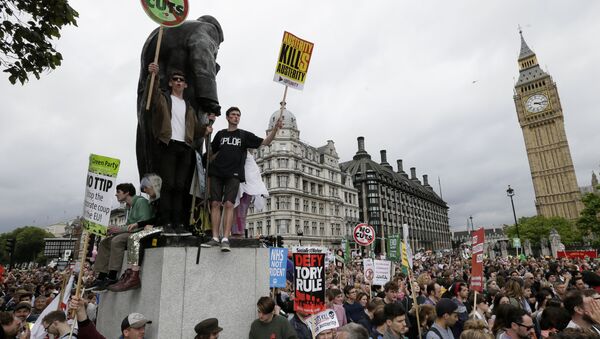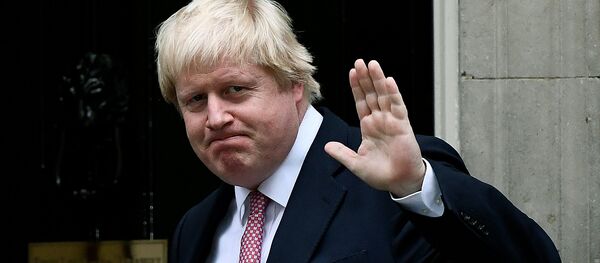The Conservative Party, first in concert with the Liberal Democrats followed by a solo act and now performing in a duo with the Democratic Unionist Party (DUP), has maintained its position as the party of government based on what its opponents, for Tories never seem to use the term, call "austerity" and it used to call a "long term economic plan."

The battle was pitched as the Tories, who would cut back on state spending and prudently balance the books, against the Labour Party that sought to spend more and invest. Marching under their respective banners, emblazoned with the somber faces of Friedrich August Von Hayek and John Maynard Keynes, the two ideological armies have been in battle over "austerity" ever since, and, with enough historical hindsight, have been ever since 1936 when Keynes published The General Theory of Employment, Interest and Money or perhaps 1944, when Hayek produced The Road to Serfdom.
The latest skirmish in the war of prudence versus pump-priming has been over the continuing public sector pay freeze, a 2010 Tory manifesto commitment to cap pay rises in the public sector at 1 percent, which, as a quick bit of adjusting for inflation maths will show, constituted a real terms pay cut across the public sector.

With the recent move to a more emotional, cultural, and identity-driven politics being what it is and the stark memories of the heroic firefighters of Grenfell Tower still lodged in our national memory (where it ought to remain until a dramatic and people-centered overhaul of UK local authority housing policy has happened) the issue of capping public sector pay rises has been controversial. It has seen the Tory/DUP team being tested in Parliament, Foreign Secretary and political attack submarine, Boris Johnson, almost breaking ranks, and has elicited many visceral and heartfelt responses.
All things must be taken in their proper context and for that reason the furore over the public sector pay cap ought to be considered as both an issue in its own right, but also as an example of the continuing debate over austerity on the one hand versus the alternative, the weak point of which is a severe lack of clarity. This debate will, presumably, continue to rage until another seismic economic shift takes place or some other event occurs of enough significance to lessen its grip on the national conversation.
The essential point is that "austerity" does not mean austerity or being austere… far from it.
Would a country that was going through anything like "austerity," despite tinkering around the edges with policies on welfare, administration, and public sector pay — massive issues for the individuals concerned, but insignificant in terms of the macroeconomic picture — really continue to run a deficit, the difference between incomings and outgoing for one year, as high as it was in 2016, a cool £52 billion (US$67.4bn)?
Would a nation that had been living in austere circumstances have a national debt totalling 89.1 percent of GDP?
Would that same country, bearing in mind that it was living under the restrictions of austerity, have chosen to host the Olympic Games in 2012?
There are many other facts that could be drawn upon to demonstrate that the United Kingdom, far from being in a state of "austerity," is and has been living out with its means for a long time and all that has happened has been some slight adjustments and a change in the public lexicon.
We have carried on spending money that we don't have or that rightfully belongs to our children for our own purposes and, even worse, on servicing the monstrous debt we have lumbered them with.
The Conservative MEP Daniel Hannan, in his takedown of the then-Prime Minister Gordon Brown in the European Parliament, although he might as well have been addressing all British politicians, said it best when he declared, "You cannot spend your way out of recession or borrow your way out of debt." That is what we have tried to do and it has failed.
The scale of the problem does not even seem to be acknowledged. With a national debt that is forecast to be £2 trillion (US$2.6 trillion) by the 2020's, a governing party that continues to dither on simply not make things any worse, and an opposition that does not seem to even realize that the problem even exists; Britain, like many other countries, stands at the mercy of real interest rates and our creditors.
In that sense, we don't really have much in the way of sovereignty, regardless of our supranational position. We're locked into what the former Texas Congressman Ron Paul called, "the deceitful and evil process of inflating and borrowing" without anyone proposing a serious way out. If someone were to come along and propose the required measures, including a radical new monetary policy to establish again the seriousness of the pound sterling and a grand reappraisal of what role the government has in the lives of the citizens it works for, then it would be unlikely that they would prove very popular as the medicine they offered would not taste nice.
However, if we continue to pretend either that the problem doesn't exist, is in fact another problem, or, worst of all, that we're actually taking an equally effective medicine absent of side effects, the choice to take it will no longer be ours.
The views expressed in this article are solely those of the author and do not necessarily reflect the official position of Sputnik.





